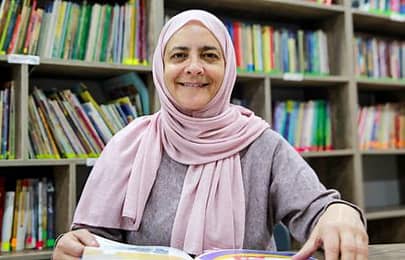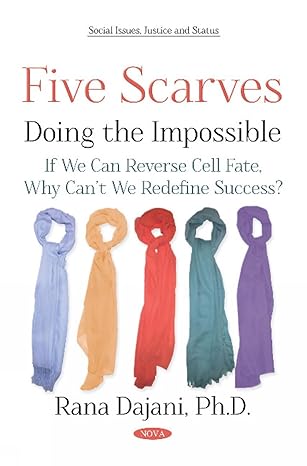Pathbreakers of Arab America—Rana Dajani

By: John Mason / Arab America Contributing Writer
This is the eightieth in Arab America’s series on American pathbreakers of Arab descent. The series features personalities from various fields, including entertainment, business, sports, science, the arts, academia, journalism, and politics, among others. Our eightieth pathbreaker, Rana Dajani, is a Jordanian molecular biologist and tenured professor of biology and biotechnology at Hashemite University. She has expertise in epigenetics and biomarkers of trauma among refugees, and her research has impacted Jordan’s stem cell research ethics law. Significantly, Rana’s vision goes beyond science to include children’s and women’s rights and opportunities.
World-renowned scientist, Rana Dajani, is recognized for her genome-wide research on diabetes, cancer, and stem cells
While Dajani was born to a Palestinian father and a Syrian mother, she holds a Jordanian passport. She describes her nationality as “half Palestinian and half Syrian with a Jordanian passport.” She is the mother of four children. She obtained a General Certificate of Education from the University of London in 1985, before pursuing her bachelor’s degree in biology at the University of Jordan. She followed that with a master’s degree also in biology from the same university in 1992. In pursuit of both degrees, Rana won the First Honors Award. She then entered the University of Iowa, earning a Ph.D. in molecular biology in 2005.
Dajani’s career and life have taken many twists and turns, beginning as a lecturer at the Philadelphia University in Jordan after gaining her Master’s. This was followed by five years teaching at the Amman Academy. Around 2005, Rana became an assistant professor at the Hashemite University, moving through the ranks to become a tenured professor. As she became more well-known in her field, Dajani was invited overseas to accept visiting positions, including, in 2012, an assistant professorship in the Department of Genetics at Yale University. She then became a mentor at Stanford University’s American Middle Eastern Network for Dialogue at Stanford. Rana recently held the 2019-21 Zuzana Simoniova Cmelikova Visiting Scholar position at the Jepson School of Leadership Studies at the University of Richmond.
As may only seem reasonable for an accomplished scientist, Dajani advocates the scientific theory of biological evolution, distinguishing from some Islamic scholars, who back theistic and creationist views. Some modern Muslims differentiate between two kinds of truth, the revealed and the empirical. Others argue that faith and science can be integrated and complement each other.
Underscoring her scientific credentials, Dajani is president of the Society for Advancement of Science and Technology in the Arab World (SASTA). She is a Fulbright scholar alumna, having received two awards, and has been a fellow at the Radcliffe Institute for Advanced Study at Harvard University, as well as a recipient of an Eisenhower Fellowship. Rana is also a former visiting professor at Yale University’s Stem Cell Center and a visiting scholar at both the University of Cambridge and the Stem Cell Therapy Center in Jordan.
Through her leadership, she has introduced national and regional stem cell laws and presided over numerous scientific boards and United Nations councils, most recently as President of SASTA.

Dajani’s scientific view has spilled over into the humanistic side of her life, aimed at aiding children and women
Extending out of her field of science, Rana founded an NGO called ‘We Love Reading,’ ‘Taghyeer’ (the Arabic word meaning change), training women to read aloud, and establishing libraries in different areas in Jordan, inciting a love of reading in young children in 2009. She directed the Center for Service Learning at Hashemite University from 2009 to 2010 and then led the Center for Studies from 2011 to 2012. She has been appointed a Higher Education Reform Expert by TEMPUS Jordan.
Dajani is a strong advocate for women’s empowerment, with membership in various organizations, including the United Nations Women Jordan Advisory Council. Through We Love Reading, Rana has trained over 7,000 women to read aloud in Jordan, Lebanon, and Syria, and established multiple libraries across the country. In Jordan alone, the literacy of over 10,000 children has been improved, with 60% of them being female. A recipient of the UNESCO International Literacy Prize, We Love Reading has established over 4,000 locally run libraries in over 60 countries.
Dajani has written in ‘Nature’ about education and women in the Arab World and science, and she is on the Arabian Business list “The World’s 100 Most Powerful Arab Women.” In 2017, she was among seven Fulbright alumni to receive the inaugural IIE Global Changemaker Award. For her role in We Love Reading, Rana received the Library of Congress Literacy Award Best Practices, a Stars Impact Award, the Synergos Arab World Social Innovator award, a WISE Award, and recognition from IDEO.org. A 2014 Eisenhower Fellow and a member of Jordan’s Order of Al Hussein for Distinguished Contributions of the Second Class.
In 2017, Rana published an exciting study titled ‘Five Scarves: Doing the Impossible-If We Can Reverse Cell Fate, Why Can’t We Redefine Success?’ It “is an exploration of the intersections between gender, race, religion, and science told through the eyes of one of the world’s leading Muslim women scientists.” In it, she “points to the 2006 discovery of induced pluripotent stem cells, which allowed researchers to reverse engineer embryonic life forms, and asks us why a similar breakthrough might not be possible in the pursuit of gender equality.”

A review of the book nicely depicts Rana’s pursuit of science and its intersection with humanistic thinking: “Seeking a paradigm shift in the fight against women’s oppression, Dajani makes the case for radically transforming the social institutions, cultures, and customs of our world to fully validate and support all women. The reader is led through the many phases of Dajani’s dizzying life journey, from the bustling world of Amman to the quiet neighborhoods of Iowa City, back through Jordan’s universities, schools, and refugee camps, and into the halls of Harvard, Cambridge, Grenoble, and the United Nations.”
The review continues: “The author wears five scarves: those of a mother, teacher, scientist, social entrepreneur, and feminist. Her story tells of all the challenges she’s faced and the innovations she’s made in everything from genetic analysis and science pedagogy to grassroots social change and Islamic perspectives on evolution. Finally, Dajani offers a provocative and far-reaching meditation on the fight for women’s liberation today and what it would take to build a truly equal and humane society.”
What a breath of fresh air Rana is in a world that needs even more of what she has already bestowed upon us!
Sources:
–“Rana Dajani,” Wikipedia Series on Arab Americans, 2025
–“Rana Dajani, Professor of Molecular Biology, Brief biography,” Yale College, 2024
–“Rana Dajani,” Rita A. Hauser Fellow in Medicine, Harvard Radcliffe Institute, 2017-2018
John Mason, Ph.D., focuses on Arab culture, society, and history and is the author of LEFT-HANDED IN AN ISLAMIC WORLD: An Anthropologist’s Journey into the Middle East, New Academia Publishing, 2017. He has taught at the University of Libya, Benghazi, Rennselaer Polytechnic Institute in New York, and the American University in Cairo; John served with the United Nations in Tripoli, Libya, and consulted extensively on socioeconomic and political development for USAID and the World Bank in 65 countries.
The views and opinions expressed in this article are those of the author and do not necessarily reflect the position of Arab America. The reproduction of this article is permissible with proper credit to Arab America and the author.
Want more articles like this? Sign up for our e-newsletter!
Check out our blog here!








